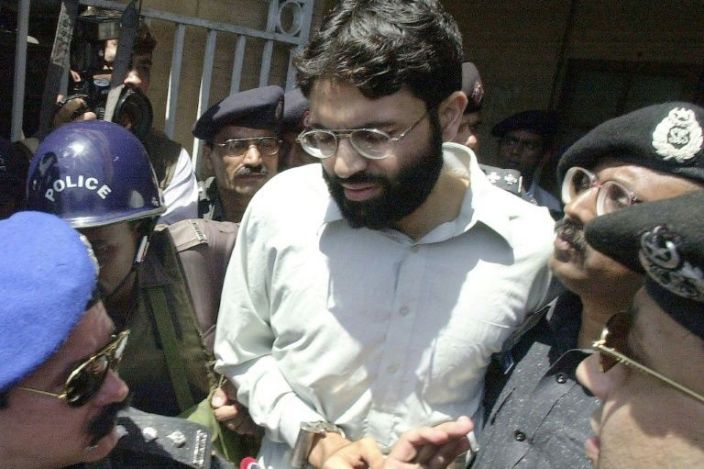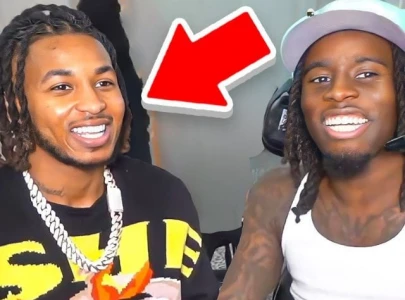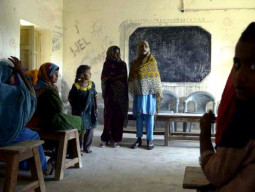
A three-member bench of the Supreme Court through a majority verdict on Thursday acquitted all the accused involved in the murder case of American journalist Daniel Pearl, ordering release of the four men languishing in jails for the past 18 years.
Sitting on the bench, Justice Yahya Afridi, while dissenting the majority order, partly allowed the Sindh government appeal in terms that Ahmed Omer Shaikh and Fahad Nasim were convicted under sections 365-A and 120-B, PPC and section 7 of the Anti-Terrorism Act, 1997.
The bench, led by Justice Mushir Alam and also including Justice Sardar Tariq Masood, dismissed a series of appeals filed by the Sindh government and the Pearl family against the acquittal of the four men by the Sindh High Court (SHC) last year.
“For the reasons to be recorded later, by a majority of 2 to 1 (Yahya Afridi, J. dissenting), Criminal Appeals No. 599, 600 & 601 of 2020, Criminal Petitions No. 1085 & 1086 of 2020 are dismissed,” the bench said in its short order, authored by Justice Alam.
“The impugned judgment dated 02.04.2020 passed by the High Court of Sindh, Karachi is maintained to the extent of acquittal of all the four respondents from their charges. Criminal Appeal No. 602 of 2020 filed by Ahmed Omer Shaikh against his conviction under section 362, PPC, is allowed and he is acquitted of the charge by extending the benefit of doubt to him,” it added.
“Ahmed Omer Shaikh, Fahad Nasim Ahmed, Syed Salman Saqib and Shaikh Muhammad Adil shall be released from the jail forthwith if not required to be detained in connection with any other case. All the miscellaneous applications filed by the either party have lost their relevance, hence, disposed of as such.”
Justice Afridi while dissenting the order partly allowed the Sindh government appeal in terms that Shaikh and Nasim were convicted under sections 365-A and 120-B, PPC and section 7 of the Anti-Terrorism Act, 1997 each and sentenced to imprisonment for life on each count.
“All the sentences passed against both of the convicts shall run concurrently. The benefit under section 382-B, Cr.P.C. shall be extended to them. To the extent of Syed Salman Saqib and Shaikh Muhammad Adil Criminal Appeals No. 599, 600 & 601 of 2020 and Criminal Petitions No. 1085 & 1086 of 2020 are dismissed and their acquittal is maintained on all the charges,” the judge said.
“They shall be released from the jail forthwith if not required to be detained in connection with any other case. Criminal Appeal No. 602 of 2002 filed by Ahmed Omer Shaikh is dismissed,” Justice Afridi added.
Pearl, 38, was kidnapped while working for the New York-based Wall Street Journal. His case grabbed headlines globally after a video of his beheading emerged weeks after he was abducted. Sheikh and three co-accused were convicted in the case by an anti-terrorism court (ATC).
In April last year, an SHC division bench commuted the death sentence awarded to Ahmed Omar Saeed Sheikh to 7 years and acquitted the three others who were serving life terms awarded to them by the ATC.
The provincial government swiftly challenged the SHC order in the Supreme Court. The Sindh government had also immediately detained the four men under Section 3 (1) of West Pakistan Maintenance of Public Order (MPO) Ordinance 1960.
Later, a three judge bench of the apex court heard the case. Several hearings were conducted by the bench, during which Farooq H Naek represented the Sindh government while Faisal Siddiqi argued on behalf of Daniel Pearl parents.
Read More: Pearl case does not fall in terrorism category, SC told
Pearl family ‘shocked’
After the announcement of the order on Thursday, a meeting of senior officials was held to evolve a future plan of action in this matter, while the family of Pearl expressed their “complete shock” at the Supreme Court decision.
“Today’s decision is a complete travesty of justice and the release of these killers puts in danger journalists everywhere and the people of Pakistan,” Judea and Ruth Pearl said in a statement issued after the announcement of the apex court’s decision.
They urged the US government to “take all necessary actions under the law to correct this injustice”. They hoped that the Pakistani authorities would also take necessary steps to “rectify this travesty of justice”. “No amount of injustice will defeat our resolve to fight for justice for Daniel Pearl.”
In a statement last month, the then-US acting Attorney General Jeffrey Rosen had said that Washington “stands ready to take custody of Omar Sheikh to stand trial here” after labelling the acquittal by the SHC “an affront to terrorism victims everywhere”.
In January 2011, a report released by the Pearl Project at Georgetown University following an investigation into his death made chilling revelations, claiming that the wrong men were convicted for Pearl’s murder.
The investigation, led by Pearl’s friend and former Wall Street Journal colleague Asra Nomani, and a Georgetown University professor, claimed the reporter was murdered by Khalid Sheikh Mohammed, the alleged mastermind of the September 11, 2001 attacks, not Sheikh. (WITH INPUT FROM AGENCIES)
Pearl’s murder
Daniel Pearl, 38, was the South Asia bureau chief for The Wall Street Journal when he was abducted in Karachi in January 2002. Pearl’s wife Marianne Pearl, a US national who was living in Karachi, wrote a letter to the Artillery Maidan police on February 2, 2002, stating that her husband disappeared on January 23, 2002.
Later, a graphic video showing Pearl’s decapitation was delivered to the US consulate in Karachi nearly a month after he was kidnapped. After this, a case was filed against the suspects and 23 witnesses were produced in the case by the prosecution. Sheikh was arrested in February 2002.
Additional input by AFP


1730464111-0/raygun-(1)1730464111-0-165x106.webp)
1730967569-0/BeFunky-collage-(28)1730967569-0-165x106.webp)
1730967164-0/trump-(21)1730967164-0-165x106.webp)












COMMENTS
Comments are moderated and generally will be posted if they are on-topic and not abusive.
For more information, please see our Comments FAQ